As the new school year begins, college students planning to study abroad should start preparing for their study abroad experience. Some students think they have all the time to figure it out. However, many miss out because they do not understand how important the first three months of the school season are to ensure a smooth traveling experience. The months of September, October, and November are when most scholarship deadlines close. Therefore, students planning to study abroad should use the first three months to thoroughly plan and prepare for their study abroad plans. This blog aims to help college students who are aspiring to study abroad with their preparation. It will highlight 7 Factors American Students Should Consider When Planning to Study Abroad and offer tips on scholarship opportunities and other resources for students of all majors to experience this wonderful college experience. Before we dive in, let’s discuss the study abroad statistics.

Study Abroad Statistics
Studying abroad, like traveling itself, has become increasingly popular among many young people, especially students. IIE Open Doors findings state that in the academic year 2022-2023, there was a 49% increase in students studying abroad. American students have studied in over 180 countries, and European countries such as Spain, France, Italy, and the United Kingdom are among the top destinations for American students.
The demographics of American students studying abroad have remained unchanged from previous years. There is still a racial and gender gap in the representation of American students abroad. Students of color represent 34% of Americans studying abroad; most students are female, and those with majors in Business and Social Sciences are among the most likely to study overseas. Although it is a great thing that American college students are studying abroad, the gap is also alarming. However, the gap is due to valid reasons that some students have.
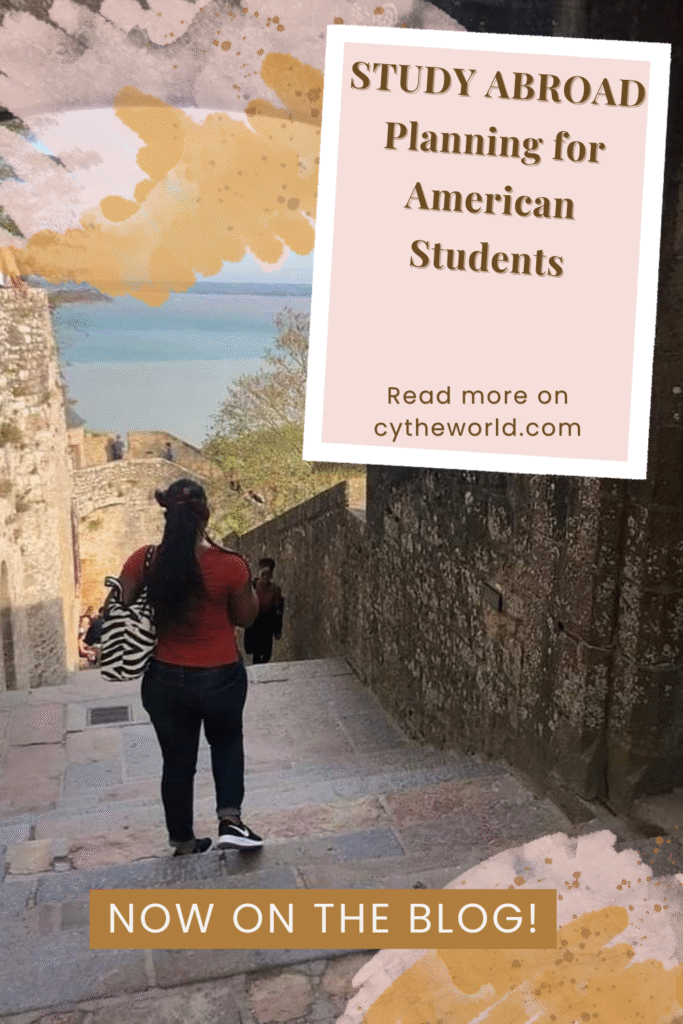
One of the pressing questions I get is, “How did you decide to study abroad? Did your major allow it? Where did you start when preparing to study abroad?” Sometimes, students tell me they want to study abroad but are unsure how to balance it with their majors. Most students worry about the financial aspect of studying abroad, and many university counselors do not provide them with a comprehensive view of the costs associated with studying abroad. Other students who want to study overseas are hesitant because they are afraid to undertake such a significant change. Where will they go? Should they already speak another language? How much adaptation will one have to undergo if they travel to a country like X?
All of these concerns are valid. For example, most American college students take out thousands of dollars in loans to attend college. Therefore, it is understandable that many students do not go abroad because they do not want to increase their loan burden. However, with every problem, there is a solution. This post offers study-abroad tips for American students by examining the seven key factors they should consider when applying to study abroad. This post will discuss significant aspects of deciding where to go, what results you want for your study abroad program, and things to do to make the process easy and burden-free. Before doing so, it is vital to situate the benefits of an international education and international experiences.
The Benefit of International Education
Today’s society is more connected than in prior times in history. We have a lot of information and have the world at our fingertips. Hence, there is a need for international education and mutual understanding between cultures. That is why businesses, schools, and parents advocate for the younger generations to study abroad, mingle with people from diverse communities, and have international experiences. The benefits of international exploration are vast. Some of its benefits include gaining a global perspective, fostering personal growth, unlocking professional opportunities, and enhancing communication skills. Hence, as a young professional, it is essential to explore international education.
International education fosters a broader worldview, helping individuals understand diverse cultures, perspectives, and global issues. People who participate in study abroad programs immerse themselves in a different culture, which enhances their cultural sensitivity, respect, and empathy for individuals from diverse backgrounds. Studying abroad often requires adapting to new languages, improving communication skills, and boosting confidence in cross-cultural interactions. Facing challenges while studying abroad encourages personal growth, self-reliance, adaptability, and increases self-confidence and resilience.
Employers highly seek graduates with international education experience, as they possess cross-cultural skills and a global mindset crucial in today’s interconnected world. Learning in different educational systems can provide unique insights, broaden knowledge, and expose students to cutting-edge research and teaching methods. Building a global network of friends, mentors, and professionals can lead to lifelong connections and collaborations across borders.

Navigating new environments and challenges fosters leadership qualities, problem-solving skills, and the ability to thrive in diverse teams. I remember how bold I felt after overcoming the burglary at my Airbnb in Marseille and practicing self-agency. Living abroad hones adaptability, creativity, and the ability to function effectively in unfamiliar settings. International education equips individuals to contribute to global challenges such as climate change, health crises, and social inequality through diverse perspectives and collaborative solutions. Exposure to diverse cultures and ideas sparks innovation and entrepreneurial thinking, leading to the development of unique solutions and products.
The transformative experience of studying abroad often leads to a more profound sense of self-awareness, fulfillment, and a lifelong passion for exploration and learning. International education can inspire active citizenship, encouraging individuals to be informed global citizens who engage in international dialogues and advocacy. International education promotes mutual understanding and peaceful coexistence by breaking down stereotypes and fostering positive interactions between people from different nations. Because there is a demand for global solutions to tackle complex global challenges, there are requirements for a collaborative and multidisciplinary approach, which international education facilitates by bringing together diverse perspectives and expertise. These facts underscore the multifaceted importance of global education in shaping young individuals and preparing them for a world that is increasingly interconnected globally.
With all these benefits, many young Americans are unable to take advantage of them. The statistics we discussed above indicated that many American students do not study abroad. The face of America abroad is young, white, and female. Due to these statistics, when I returned from my travels abroad, I wanted to encourage people who looked like me to participate in study abroad programs. That is why I started this blog.
I wanted to share my stories and offer advice to young American students and professionals about the benefits of an international experience. As an advocate of studying abroad, I advise potential students to be realistic about their expectations and conduct thorough research before embarking on such a transformative journey. To help my readers better prepare for studying abroad, I’ve identified 7 key factors that American students should consider when planning.
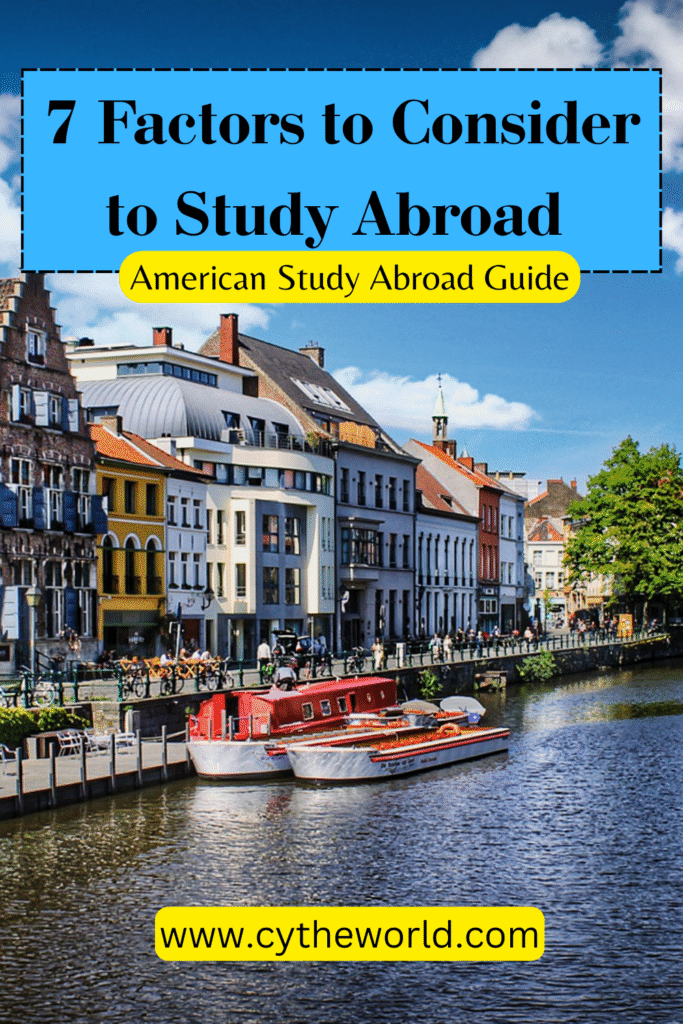
7 Things to Consider Before Studying Abroad
- Choosing the Right Study Abroad Program
Selecting the appropriate study abroad program is pivotal. Students should align the program’s curriculum, duration, and location with their academic goals and personal preferences. Whether it’s a semester, year-long, or short-term program, the choice should complement their major and contribute to their educational journey.
Once upon a time, I was obsessed with attending big-name schools. However, I learned that instead of focusing on the school, I should focus on the programs. Of course, we are wired to think that attending Harvard or Yale will provide the best academic experience. Although this may be true for some places like Harvard & Yale, trying to attend a big-name school for your study abroad may be pointless. Instead, focus on the program a particular school offers.
For example, I chose to study Conflict and Development studies in Ghent because the program was unique. When you Google conflict & development studies, the first link is that of the University of Ghent. The interdisciplinary aspects of Conflict and Development are highly valued in my field of interest. Choosing to do this program gave me a significant advantage because it provided me with a unique set of tools to tackle the pressing issues in my field.
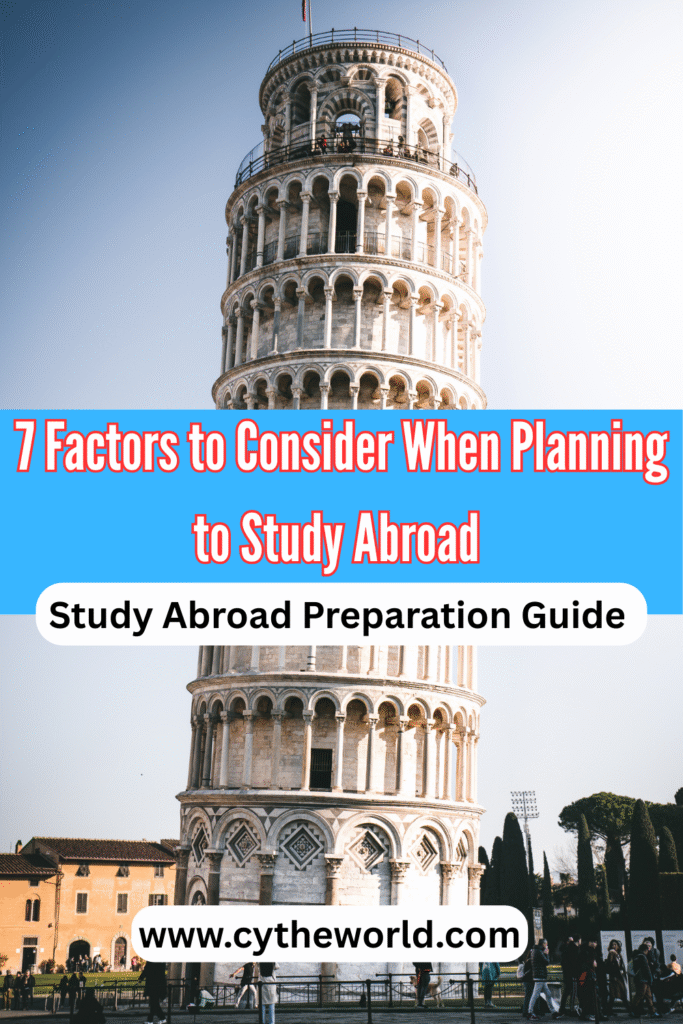
That is what your study abroad should be about. It is not just about applying to Oxford and saying you’ve entered its halls; you want to select a program (which may be offered at Oxford) that provides a unique experience and enhances your credentials in your field. In Europe, for example, the educational system is different from ours. Instead of the Liberal Arts trajectories most undergrads undertake in the U.S., European students enter their preferred professional degrees. Those who want to be lawyers study law as undergrads. For my study abroad program, I went to SciencePo Rennes in France, a school specializing in Politics and Governmental studies.
SciencesPo, as an institution, is renowned for producing seven of France’s presidents, including the current French president. Although the school I attended is not the same branch as these presidents, being associated with Sciences Po, a specialized institution in my field, adds a unique credential to my resume. Moreover, choosing a suitable program depends on how well aligned it is with your principal and academic goals.
- Alignment with Major and Academic Goals
The second factor to consider when planning to study abroad is whether your program aligns with your academic major and goals. When preparing to study overseas, it is essential to consider how the program aligns with your primary academic goals. Your study abroad experience should seamlessly integrate with your principal and educational aspirations. Research universities and programs renowned for their excellence in the chosen field, ensuring that the coursework abroad adds value to your degree and future career prospects.
Some individuals require assistance in accurately correlating their majors with international relations. I sometimes hear students in STEM say they cannot study abroad because most students who study abroad are interested in international relations, government, and related fields. This mentality is a setback. Regardless of your major, you can go abroad and have a global education experience that will add another layer to your career goals.

One of my acquaintances completed an engineering program in France, attending the University of Technology of Compiègne, a top engineering school in the country. Her experiences contributed to her academic goals, allowing her to compare and contrast the education standards of the U.S. and France in her Engineering field. Obtaining another country’s perspective or methodology in your field of study enables you to provide a different, more robust, and nuanced analysis that will set you apart from your peers.
Sometimes, your study abroad may have nothing to do with your major. You may find a program that differs from your academic major, but it can still add value to your life goals. My initial ambition to study abroad stemmed from my aspiration to become a diplomat and engage with diverse cultures. Regardless of my major, I knew I wanted to pursue an international career that would allow me to serve people from diverse cultures, communities, and countries. If I were to become a medical doctor, I would work for the World Health Organization or Médecins Sans Frontières. If I were to become an architect, I would want to study different styles of architecture from places like Italy, England, or France to create my own model. Therefore, you don’t have to always align with your college major, but consider your life goal.
My goal is to have multicultural experiences that align with my career ambitions, which is how studying abroad can contribute to whatever your ambition may be. Most people do not end up pursuing the field they studied in college. Therefore, gaining experiences that can help you achieve your life goals, not just your career. If you are passionate about teaching, you can teach English, French, or Spanish abroad. Here, your international education experience has less to do with your major than with your life’s passion.

- Financial Considerations and Scholarships
The third factor that American students should consider when applying to study abroad is finances. Finances play a significant role in determining whether to study abroad and where to do so. As American students, we are all too aware of the financial burden of attending school. One of the main reasons American students do not study abroad is that they believe it is expensive and wish to avoid accumulating more loans. That is why evaluating the total cost, including tuition, accommodation, travel, and living expenses, is crucial when deciding to study abroad. Exploring scholarships, grants, and financial aid options can help alleviate the financial burden and make the experience more accessible. Here are three ways to participate in a program with less financial burden.
- Faculty-Led Programs
If this is your first time traveling, faculty-led programs are an excellent way to embark on a study abroad experience. The programs are during Winter, spring, or summer break. Professors lead faculty-led programs, each with a specific goal. For instance, a history professor can create a program for students to study the pyramids in Egypt, or an environmental professor can create a program for students to study the coral reefs in Hawaii, allowing interested students to sign up for those trips. Faculty-led programs offer a perfect study abroad opportunity for students in specific majors, those who cannot attend a semester abroad or an academic abroad due to their majors’ strict requirements, and students who are not comfortable traveling abroad alone. Here is a list of my university’s Faculty-led initiatives as an example.
Another reason faculty-led programs are outstanding is that they are more affordable. You can afford it by applying for internal scholarships offered by various offices on your campus. Because host universities in other countries host faculty-led programs, there are instances where they will cover some of the expenses for you. My first trip abroad to China was through a faculty-led program. The Chinese program covered the visa application fee. Our Chinese department has received funding to cover the costs of our flight and accommodation at East China Normal University in Shanghai. I received internal scholarships from the International Office at my Alma mater, the Office of Diversity, Inclusion, and Equality, and the President’s Office. Because of this, I was able to have my first experience studying abroad without any financial burden, which showed me that it is possible to have such experiences without incurring significant costs.

- Direct Exchange
The second way to study abroad without financial burden is through a direct exchange. Through direct exchange, you go to international schools with which your university has a partnership. In a direct exchange, you trade places with another international student from the partner university where you are going. You only have to pay for tuition because your university will transfer your credits and count them as credits toward your major and diploma. My study abroad program in France was through a direct exchange. Because I spent a year abroad, I got 80% of my course credits toward my French major. Since I only had to pay for tuition and insurance, the university refunded the remainder of my scholarship. I did not have to take out a loan for that academic year.
You can also study abroad through a third-party provider like CIEE. CIEE, the Council on International Educational Exchange, offers study abroad programs worldwide to college students, professionals, and educators, fostering mutual understanding among diverse cultures. It helps American Students go abroad and helps international students come to the United States for studies. It is an excellent resource for students who cannot fit their study abroad ambitions into their university schedule. It also offers internship abroad opportunities.
Students can also participate in direct exchange without the middleman being their university or non-profit organizations, such as CIEE. You can apply directly to a foreign university and enroll as a visiting student. You pay directly to the foreign university and handle your own logistics. This option offers a great deal of freedom and is ideal for students seeking to expand their international exposure. However, with this option, there is no guarantee your course credit will transfer to your home university. It also has less hands-on support from your home institutions, which is vital in case of emergencies. Being responsible for your own logistics, such as housing, can be a significant challenge. I had to do it during my Fulbright experience in Belgium, and it was tough. I discussed a bit of it in this post. Check it out! However, if you are up for the challenge, this is another option when thinking about finances and your budget.

- Department of State Fundings
Another way to study abroad without incurring a financial burden is through Department of State funding opportunities. Due to the value of international education, the United States government offers numerous funding opportunities to enable students from all backgrounds to study abroad. There are scholarships, such as the Gilman, geared toward underrepresented communities. To accommodate students from diverse educational backgrounds, the Gilman program offers subcategories tailored to students in STEM fields, those who speak critical languages, and those with military backgrounds through the Gilman-McCain Scholarships. Other scholarships, such as the Boren & CLS, are available for students interested in learning critical languages, including Arabic, Chinese, or Swahili. This post provides a more detailed discussion of these scholarship opportunities. It is essential to know that some of this funding ranges from $1,000 to $25,000, allowing you to enjoy all the benefits of studying abroad without any financial burden.
I received two Department of State funding programs, the Gilman Scholarship to France and the Fulbright to Belgium, among many other scholarships that have enabled me to study abroad without any financial burden. Upon examining my study abroad experiences, which spanned China to Belgium, I received a combined total of $50,000 in scholarships and tuition reimbursements. This demonstrates that studying abroad is possible without financial burden, provided you actively seek out scholarship opportunities. Any student interested in studying abroad should be familiar with two campus offices: the International Office and the Office of Fellowship and Academic Opportunities.
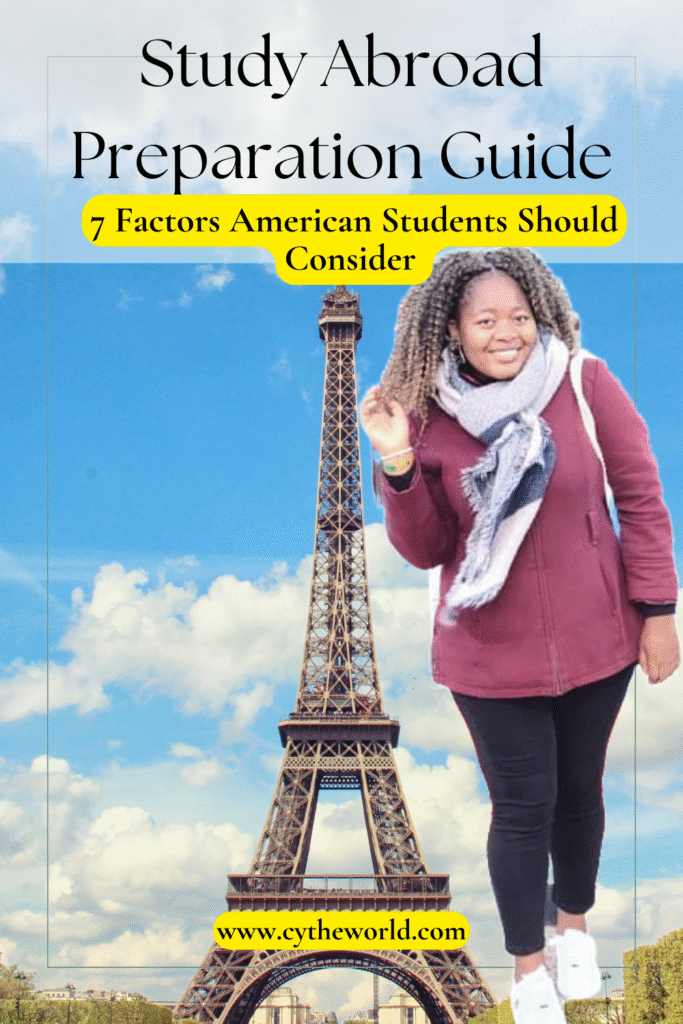
- Acquiring Language Proficiency
While not all study abroad destinations necessitate learning a new language, having a basic grasp of the local language can significantly enhance the overall experience. Therefore, when considering studying abroad, it is essential to factor in your language proficiency. Although English is a global language, acquiring new languages is pivotal to fostering better intercultural exchange and building communities in different parts of the world. When you study abroad, especially for a semester or an academic year, you become fully immersed in the local community. To order coffee at a small-town cafe, you will need to be familiar with the local language. Wherever you hope to study abroad, evaluating your day-to-day communication with the local community is vital. Knowing the basics of a language is another way to keep yourself safe and allows you to blend in.
You don’t have to know a language before traveling. That is why many people who study abroad take a language class in addition to the courses required for their majors. You can learn the local language while studying abroad, providing an even more intense immersion process because the country where you hope to study overseas becomes your classroom. When I studied abroad in China and France, my programs were taught in Mandarin and French, which allowed me to immerse myself in the respective countries’ cultures. In today’s market, language skills are essential for effective communication and cultural integration in programs operating in non-English-speaking countries. You enhance your resume and become more marketable to any company. That is why the U.S. government has programs geared toward acquiring foreign languages, so you should consider learning a new language when planning to study abroad.
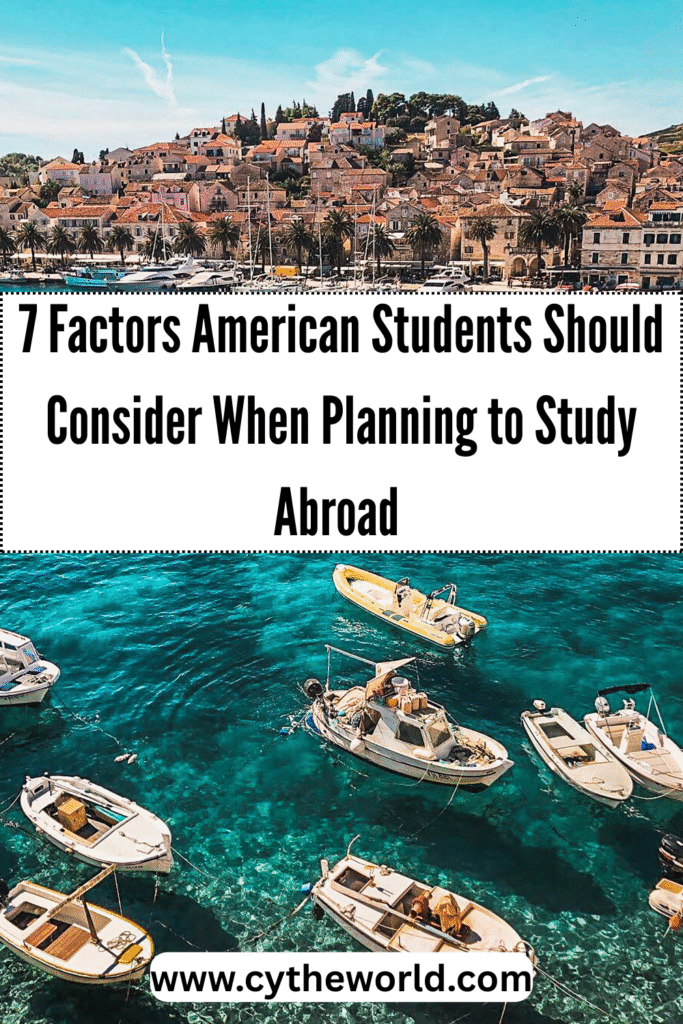
- Cultural Immersion Opportunities
Another factor potential study abroad applicants should consider is the cultural immersion opportunities. One of the most enriching aspects of studying abroad is the opportunity for cultural immersion. Students should seek programs that offer immersive experiences beyond the classroom, such as interacting with locals, participating in cultural events, and exploring historical sites. This fosters a deeper understanding of the host country’s traditions and way of life. Students should study abroad for a semester or an academic year whenever possible, as this length of time allows them to walk in other people’s shoes.
On week-long trips, I often find myself acting like a tourist, trying to see as much as possible without fully processing what I am learning or experiencing. However, living somewhere for more than four weeks makes you part of that community. You create a routine as a member of that country. The classroom is one of many learning places when studying abroad. Therefore, it is vital to choose a program where you can learn as much as possible and immerse yourself in the culture so that when you return, you can be the spokesperson for that community in your academic, personal, and professional testimonies. That is why when you apply for the programs and the scholarships, they ask how you hope to immerse yourself in the country where you propose to study abroad.

- Professional Development Opportunities
Aside from evaluating the cultural immersion opportunities, you should also consider the professional development opportunities. I advise students to consider how their chosen location will offer professional development opportunities both during and after their program. Studying abroad is not only about academics; it’s a chance to enhance professional skills and build a global network. Seek programs that offer internships, research opportunities, or connections to local industries, providing valuable hands-on experience and a competitive edge in the job market.
When I applied to study in China, France & Belgium, I had to justify why I chose those countries. I did not go to China solely because I studied the Chinese language. I went to China because I was interested in learning more about the Chinese relationship with the United States and African development efforts. I studied in France to enhance my French-speaking skills, conduct policy research, and publish my articles on development efforts in French for African Francophone countries. I attended a political school to study the bilateral relations between the U.S. and France, with a focus on their joint efforts in international developments in Africa, as well as to gain an understanding of European law regarding human rights and immigration. I met with professors involved in these efforts while living in those countries.
I volunteered at a refugee welcoming center, where I assisted new immigrant students from Afghanistan and Africa in integrating into French society. In Belgium, I connected with professors who worked at the heart of publishing and testified on issues that mattered to me. They introduced me to key publishing houses in my field and helped me build a network that I still utilize today. These examples demonstrate how your study abroad experience can offer valuable professional development opportunities. Therefore, remember to consider where to study abroad and how these programs and locations provide professional development opportunities.

- Embrace Cultural Exchange and Diversity
Last, consider embracing cultural exchange and diversity when studying abroad. Studying abroad exposes students to a diverse range of perspectives and cultures. Embracing this diversity encourages personal growth, tolerance, and the development of a global mindset – qualities increasingly valued in a connected world. I know many Americans who travel abroad, but it’s essential to recognize that they should learn from their host communities and exchange knowledge. Some Americans travel with their biases and look to tell others how they are wrong on things that they do not immerse themselves in. They want to avoid being in the learner’s seat or an observer.
Therefore, when preparing to study abroad, it is essential to mentally prepare yourself to adapt to a different culture. You should anticipate being a minority and a foreigner. You will not be in your “normal” environment, and as much as you want to be embraced in this new “normal,” you should also embrace others. If you are stuck in your ways, you will not enjoy the benefits of participating in a cultural exchange. Therefore, it is vital to prepare your mindset, learn as much as possible before traveling, and remain open-minded, because studying abroad, when done correctly, will be one of the most transformative experiences of your life.
I cannot begin to express how I have grown since I started traveling seven years ago. I began my 20s, embarking on experiences I never even dreamt of. I still cannot believe I speak Chinese. It still amazes me to say that I celebrated my 21st birthday in Paris, my 23rd in Belgium, and my 25th in Barcelona. I have become a well-rounded person, embodying diverse cultures and schools of thought, and I feel comfortable living anywhere in the world. Hence, I advocate for studying abroad, and as a 2023 Gilman Alumni Ambassador, I speak to young people and college students about the opportunities to travel and exchange cultures. When people see that you are interested in their cultures, they become interested in yours.
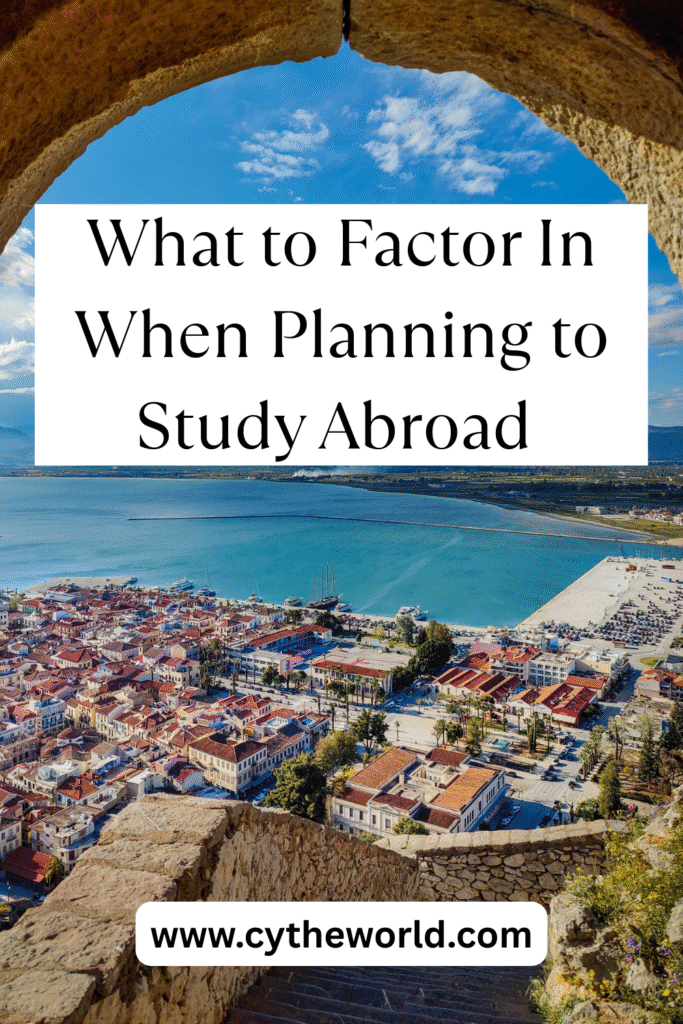
Conclusion
In conclusion, studying abroad is an adventure that offers American students a chance to broaden their horizons and shape their personal and professional identities. By carefully considering these seven factors – from selecting the right program to evaluating cultural and professional development opportunities – students can embark on a transformative journey that will leave a lasting impact on their lives. So, prepare, research, and embark on this journey with an open heart and an eagerness to learn, grow, and embrace the world.
As always, thank you for reading. Reach out if you have any follow up questions. Like, share and subscribe to our mailing list for more study abroad tips.
Until next time, happy back to school!
xoxo,
Cy
Leave a Reply
You must be logged in to post a comment.